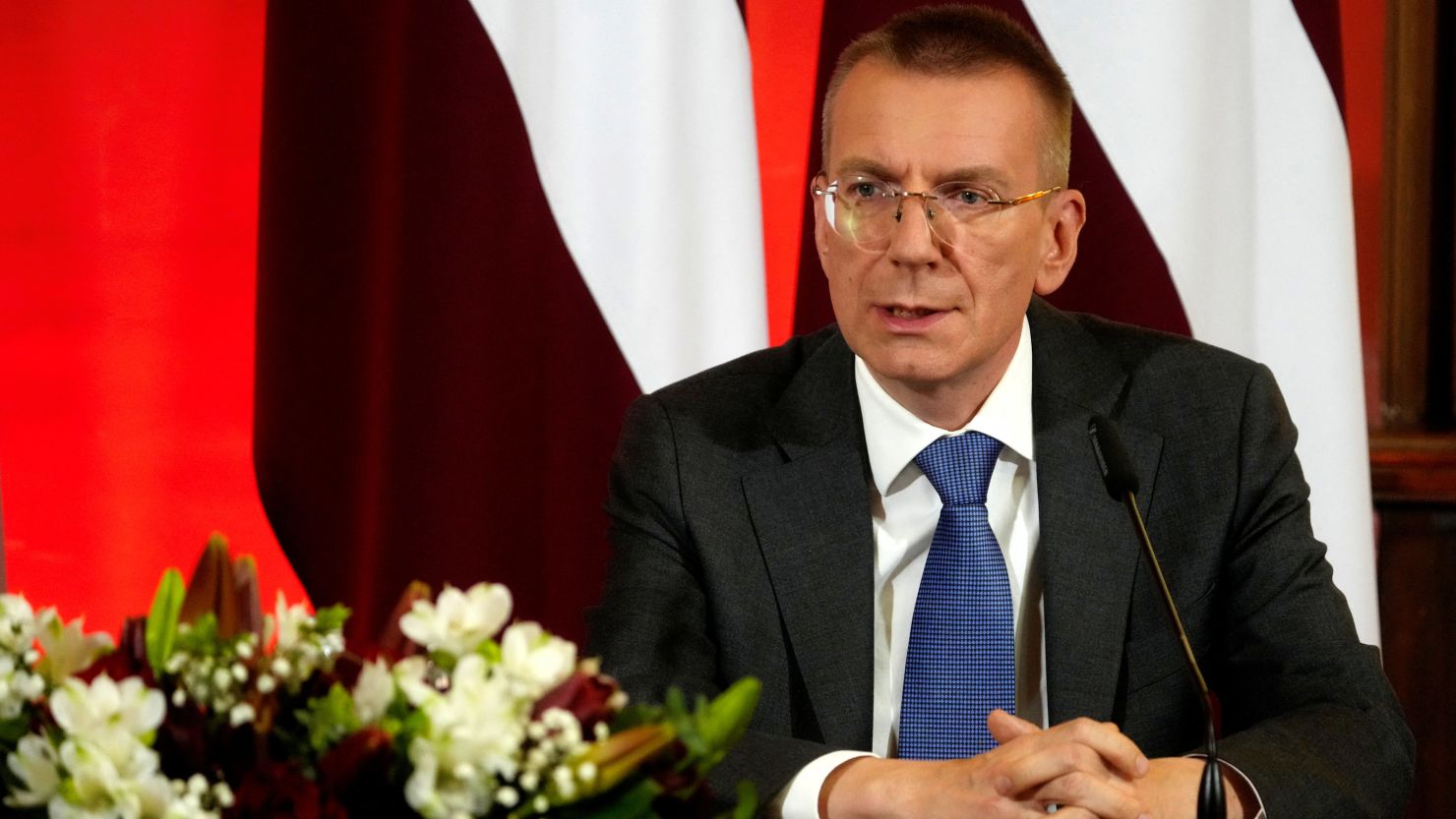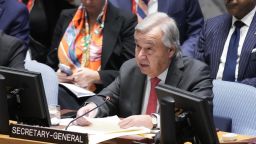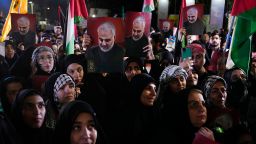Editor’s Note: David A. Andelman, a contributor to CNN, twice winner of the Deadline Club Award, is a chevalier of the French Legion of Honor, author of “A Red Line in the Sand: Diplomacy, Strategy, and the History of Wars That Might Still Happen” and blogs at SubStack’s Andelman Unleashed. He formerly was a foreign correspondent and bureau chief for The New York Times and CBS News in Europe and Asia. The views expressed in this commentary are his own. View more opinion at CNN.
What keeps Latvians, particularly their president, awake at night these days? Perhaps it is a simple confluence of circumstances. Suddenly, a war that still appears a potentially existential threat not far from their doorstep is being supplanted in the larger world’s attention by violence 1,200 miles to the south of this Baltic capital.

For if Russian President Vladimir Putin succeeds in subduing, then absorbing Ukraine, the nation of Latvia still shares a tense, 206-mile frontier with Russia and 100 more miles with the Kremlin’s closest ally, Belarus — in contrast with the 36-mile border between Israel and Gaza. If Putin is anxious to rebuild a Soviet-style empire, the threat here could certainly be immediate, but especially proximate.
“We have always realized this challenge of Russia even before the illegal annexation of Crimea back in 2014, even before Russia launched the war against Georgia,” Latvia’s determined president Edgars Rinkēvičs told me in a wide-ranging conversation on the sidelines of the Riga Conference 2023 last week. “One of the reasons why Latvia, along with Lithuania and Estonia did their best to join NATO and the EU [in 2004] was a realization, even back in the 1990s, that Russia was going to change and for the worse, not for the better.”
“These are challenging times, but I would say that we do understand that we need to be prepared for all kinds of surprises.” The Latvian leader says he doesn’t believe Russia would try to attack a NATO or EU member but it’d certainly “push the envelope in all ways possible.”
Still, if there is a single European leader capable of navigating these treacherous shoals, it is Latvia’s newly-minted president — who just turned 50 years old and is three months into his term at the helm of this Baltic nation. For his entire life, he has lived in the shadow of Russia. Born as a citizen of the Soviet Union when Latvia was a Soviet republic, he lived through his nation’s struggle for independence before serving for a dozen years as foreign minister. Now, since July, he has been its president.
Slight of build, but with a commanding, if low-key presence, his piercing blue eyes fix any visitor, conveying at once sympathy and a brilliance in command of every nuance of policy and circumstance. He is equally unique among European leaders — the only openly gay EU head of state.
And now, one threat to his equilibrium and that of his nation is the reality that the world’s attention has been diverted, at least for the moment, to the Middle East. But Rinkēvičs is persuaded this is not the time for western democracies in particular to take their eyes off the ball, as similar as the two conflicts may be in their fundamentals.
“I do believe that both Russia as a state and Hamas as a non-state actor do want to destroy the set of universal values of democracy, human rights, rule of law as we know it. Of course, one is also a nuclear power, trying to restore some kind of empire — looking not back to the Soviet Union, but back to Peter the Great. The difference is that on the one hand, this is a fight between two states —Russia and Ukraine — and then there is the fight between the state of Israel and Hamas, terrorists.”
Indeed, the battle over support for the two conflicts is being waged as fiercely in Europe as it is in a dysfunctional Washington, as Rinkēvičs certainly appreciates.
Speaking the morning after President Joe Biden declared from the Oval Office that America is still “a beacon to the world,” Rinkēvičs is still very much counting on the US, even while there is considerable skepticism building in some European quarters that the US can be relied on — especially after high-level trade talks between the US and EU broke down last weekend.
And clearly Washington recognizes the value of this relationship. Last week, the State Department signed off on Latvia’s purchase of six HIMARS (high mobility artillery rocket systems) and associated equipment — the 300-kilometer-range variety that for a long time the Biden administration had refused to authorize for Ukraine.
At the same time, on Thursday, leaders of all EU governments gathered in Brussels in an effort to chart a unified path between these two conflicts —with Gaza topping Ukraine for the first time since the Russian invasion— at a preliminary session of European foreign ministers. The final agreement was an attempt to balance both sides of the Israel and Gaza conflict, but calling for a humanitarian cease fire and corridor in Gaza to prevent a cataclysm for the civilian population. US officials were not present at the summit conference.
“We do see things that are changing rapidly, but at the same time, many in Europe, especially in my part of Europe, believe the United States is still leader of the free world.”
Rinkēvičs is every inch a realist. “Some people in the United States think they are so powerful they can address all challenges alone,” he pointed out. “Some people here in Europe think we can develop a strong Europe. The fact is that if we really want to safeguard what we have achieved so far, then we need to stick together.” Though chinks are certainly developing.
Even last weekend, Swiss voters suddenly and surprisingly turned hard right in electing a new national parliament, largely over fears that their country could be overwhelmed by immigrants. Not members of the EU, the Swiss will have little say in how Europe continues to sanction Russia or support Ukraine. But on October 1, voters in Slovakia, which is a member of both the EU and NATO, voted to allow far-right populist Robert Fico to form a government that is expected to assume a position alongside neighboring Hungary as the core of a pro-Putin bloc in the heart of Europe.
Poland last week narrowly avoided becoming a third major European nation to these two, giving a narrow parliamentary plurality to the coalition led by former EU Council President Donald Tusk.
“Now, you know this is a democratic continent,” Rinkēvičs reminded me. “I know how this works. There are a lot of movements and a lot of drama sometimes, but at the end of the day, we have been able to take decisions both in NATO and the EU. So, I do understand sensitivities but I would not exaggerate them.”
Rinkēvičs believes that in the end it is domestic issues rather than foreign policy or even military threats from abroad that truly motivate voters. “I think the major issues, frankly, are about social security, health care, some economic policies, about migration issues. Those messages resonate in a more powerful way than how we are going to deal with Russia.” But he conceded in Latvia, “it’s a bit different because of our proximity and our history.”
Rinkēvičs also believes he can even work with former US President Donald Trump if he is reelected. “We are ready of course to work with whoever the American people elect. I’m not paid for being worried. I am paid for trying to do good policy for my country, under whatever circumstances,” he said.
Get Our Free Weekly Newsletter
- Sign up for CNN Opinion’s newsletter
- Join us on Twitter and Facebook
And following 12 years as foreign minister, the second longest tenure in Europe, he observed, behind only his counterpart in Luxembourg, “things are getting more complicated.”
“When I became foreign minister, in October 2011, the president of Russia was Dmitry Medvedev, who seemed to be quite liberal. But just a couple of months afterwards, all those undemocratic things started: Demonstrations, Putin being elected for a third term as president. And of course, then came the Crimea [takeover]. Then I understood all that optimism was over.”
He said that since then, Latvia has been trying to warn the region and its allies about the threat that Russia poses.
“We have been right, we are still right. And sometimes even people here don’t get it. [So, it’s not surprising that] people in France or Britain or Germany or the United States don’t understand what is happening, what the implications could be. That’s a bit, sometimes, scary.”





